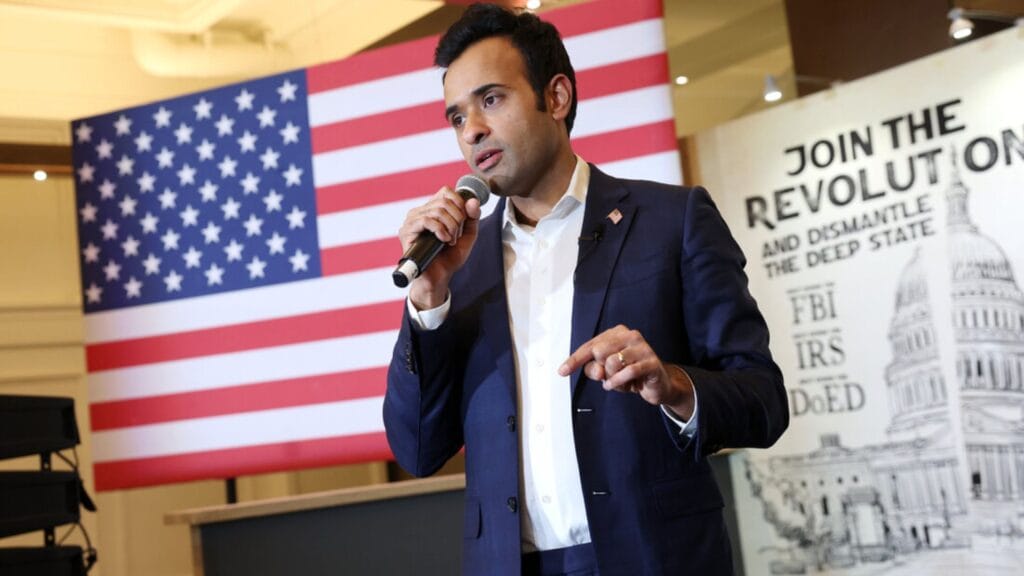New York City is making headlines once again, this time for leasing the Roosevelt Hotel in Manhattan to house undocumented immigrants. What’s unique about this deal is that the hotel is owned by Pakistan International Airlines (PIA), which is controlled by the Pakistani government. The reported $220 million over three years has drawn sharp criticism from many, including biotech entrepreneur and Republican presidential hopeful Vivek Ramaswamy.

Ramaswamy didn’t mince words when he spoke about this on social media. Writing on X (formerly Twitter), he said, “A taxpayer-funded hotel for illegal migrants is owned by the Pakistani government, which means NYC taxpayers are effectively paying a foreign government to house illegals in our own country. This is nuts.” And honestly, it’s hard to argue with his frustration here.
What’s the Deal with the Roosevelt Hotel?
For those who may not know, the Roosevelt Hotel has been a part of Manhattan’s skyline for nearly a century. However, like many businesses, it struggled during the pandemic and closed its doors in 2020 due to low occupancy and the need for renovations. Now, under a three-year lease agreement, the once-vacant hotel is back in the spotlight. The current deal offers temporary housing facilities for illegal immigrants who arrived in large numbers in New York City.
What is peculiar, though, is its broader picture. Author and columnist John LeFevre says this deal is in an overall $1.1 billion bailout package from the International Monetary Fund (IMF), one that will give Pakistan leeway from potentially defaulting on its international debts. In simpler terms, the hotel lease indirectly supports Pakistan’s shaky economy. This makes the arrangement more than just a real estate deal—it’s tangled in international politics and economics.
A taxpayer-funded hotel for illegal migrants is owned by the Pakistani government which means NYC taxpayers are effectively paying a foreign government to house illegals in our own country. This is nuts. https://t.co/Oy4Z9qoX45
— Vivek Ramaswamy (@VivekGRamaswamy) December 1, 2024Revenue for Pakistan, Costs for NYC Taxpayers
Khawaja Saad Rafique, Pakistan’s Minister of Railways and Aviation, confirmed that the agreement will bring in around $220 million in revenue for the Pakistani government. He also reassured that the hotel will return to Pakistan’s control once the lease is over. From Pakistan’s perspective, this is a smart financial move. They’re profiting from a property that’s been idle for years.
But here’s the flip side: What does this mean for NYC taxpayers? In essence, local taxes are financing a deal that benefits another country. And let’s not forget, that the hotel is not only pricey but is also operating under what critics are calling a “sweetheart deal,” meaning it is disproportionately favorable to the landlord (in this case, Pakistan).
ALSO READ | Elon Musk and Vivek Ramaswamy to Lead Trump’s Government DOGE Initiative
My Thoughts on This Deal
Honestly, this arrangement raises a lot of questions. First, why wasn’t a U.S.-owned property chosen? Surely there are other struggling hotels or facilities in New York that could be repurposed for this purpose. By choosing a foreign-owned property, it feels like a missed opportunity to reinvest that money domestically.
The optics of this deal are terrible. Now imagine going to the taxpayer and saying their hard-earned money isn’t just housing undocumented immigrants but also improving another country’s economy. For most, that adds insult to injury.
As it stands, I am well aware that NYC faces heavy pressure to deal with the rise in migrants. Sometimes it has to act, and therefore, sometimes it gets down to the most accessible, even if not the best option. However, I still feel that greater transparency on the part of the city authorities may work to ease some of the above issues. It would be clear why exactly that particular hotel was picked for accommodation and if there are alternative options.
What Should NYC Do Next?
- Focus on local solutions: Future deals should prioritize properties owned by U.S. citizens or entities. This keeps the money circulating within the local or national economy.
- Be transparent: NYC leaders need to explain their decision-making process clearly to the public to build trust.
- A long-term plan should be created: Housing migrants in hotels is a stopgap measure. The city needs to come up with sustainable strategies for integrating these people into the community without further burdening taxpayers.
What Do You Think?
This situation is complicated, no doubt. While I feel that this deal was executed very poorly, I can well see why NYC felt like it had to act. What do you think? Agree with Vivek Ramaswamy or does NYC deserve the benefit of the doubt in this tough situation?
Let us know in the comments below! Your opinions matter, and we’d love to start a conversation about this.
Minutes by M31GlobalNews






